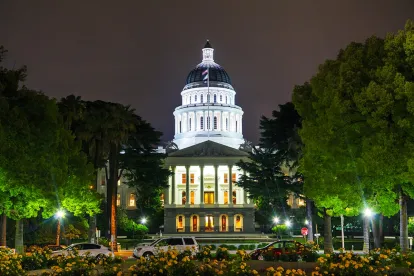On June 15, 2023, the California Fair Political Practices Commission (“FPPC”) voted to adopt proposed regulations interpreting Gov. Code Section 84308 of the Political Reform Act (the “Levine Act”). The below is only intended to be a high-level overview of the regulations. If you believe that any contributions you have made, or intend to make, may implicate the Levine Act, please consult counsel.
On September 29, 2022, Governor Gavin Newsom signed SB 1439, amending the Levine Act and broadly expanding its application to prohibit local elected officials, when serving in a position directly elected by voters, from taking part in licensing, permitting, and other land use entitlement proceedings when a party or participant in the proceeding has contributed more than $250 to the official (the Levine Act previously only applied to non-elected officials who happened to be running for a different, elected office). SB 1439 also extended the prohibition on post-proceeding contributions from three months to twelve months. The amended Levine Act became effective on January 1, 2023.
On June 15, 2023, the FPPC voted to adopt the regulations interpreting the Levine Act. The below are relevant sections of the regulations; the full text of the regulations is available on the FPPC’s website.
When Is the Effective Date?
The new prohibitions and requirements of Gov. Code Section 84308, which became effective January 1, 2023, do not apply to proceedings participated in, or contributions made to or accepted, solicited, or directed by an officer, prior to January 1, 2023. Please note that the prior version of the Levine Act and related regulations continue to apply to proceedings participated in, or contributions made to or accepted by an officer, prior to January 1, 2023. The FPPC plans to maintain copies of the prior regulations on a separate webpage until it is no longer necessary. (See Cal. Code Regs. Section 18438.)
Who Is an Officer of an Agency?
An officer of an agency “includes only those persons who may make, participate in making, or in any way attempt to use their official position to influence a decision in the license, permit, or entitlement for use proceeding, or who exercise authority or budgetary control over the agency of officers who may do so” and (1) Serve in an elected position, (2) Serve as a member of a board or commission, (3) Serve as the chief executive of a state agency or county, city, or district of any kind, or (4) Have decision making authority with respect to the proceeding and are also candidates for elected office or have been candidates for elected office in the 12 months prior to the proceeding. The Levine Act does not apply to an officer who has no control over the decisions of the agency before which a decision is pending. (See Cal. Code Regs. Section 18438.1.)
What Is a Proceeding?
A proceeding “involving a license, permit or other entitlement for use” means “any proceeding to grant, deny, revoke, restrict, or modify a license, permit or other entitlement for use that does not solely involve a purely mistrial decision and is: (1) Applied for by the party; (2) Formally or informally requested by the party; or (3) A contract between the agency and the party or a franchise granted by the agency to the party, other than a contract that is competitively bid, a labor contract, or a personal employment contract[.]” The regulation further defines the types of contracts that are exempt from the Levine Act. (See Cal. Code Regs. Section 18438.2.)
When Is a Proceeding Pending (for an Officer)?
For an officer, a proceeding is pending when “(A) The decision is before the officer for the officer’s consideration. If the officer is a member of a governing body, this includes any item placed on the agenda for discussion or decision at a public meeting of the body; or (B) The officer knows or has reason to know a proceeding involving a license, permit or other entitlement for use is before the jurisdiction of the agency for its decision or other action, and it is reasonably foreseeable the decision will come before the officer in the officer’s decision-making capacity.” (See Cal. Code Regs. Section 18438.2.)
When Is a Proceeding Pending (for a Party)?
For a party, a proceeding is pending “when it is before the jurisdiction of the agency for its decision or other action.” (See Cal. Code Regs. Section 18438.2.)
Who Is an Agent?
A person is the agent of a party or participant “only if the person represents that party or participant for compensation and appears before or otherwise communicates with the governmental agency for the purpose of influencing the pending proceeding.” An individual who engages in solely non-persuasive communications (i.e., a law firm assistant forwarding a communication by an attorney) is not an agent. (See Cal. Code Regs. Section 18438.3.)
-
“If an individual acting as an agent is an employee or member of a law, architectural, engineering or consulting firm, or a similar entity or corporation, both the entity or corporation and the individual are ‘agents.’”
-
Communication with the government agency does not include “(1) Drawings or submissions of an architectural, engineering, or similar nature prepared by a person for a client to submit in a proceeding before the agency if: (A) The work is performed pursuant to the person’s profession, and (B) The person does not make any contact with the agency other than contact with agency staff concerning the process or evaluation of the documents prepared by the official; or (2) Purely technical data or analysis provided to an agency by a person who does not otherwise engage in direct communication for the purpose of influencing the proceeding.”
Who Is a Participant?
Gov. Code Section 84308(a)(2) defines the term “participant” as “any person who is not a party but who actively supports or opposes a particular decision in a proceeding involving a license, permit, or other entitlement for use and who has a financial interest in the decision . . . [a] person actively supports or opposes a particular decision if that person lobbies in person the officers or employees of the agency, testifies in person before the agency, or otherwise acts to influence officers of the agency.” The regulations expand on the definition of “participant.” (See Cal. Code Regs. Section 18438.4.)
-
A person “lobbies in person” when they directly communicate with an officer of an agency for the purposes of influencing a decision.
-
A person “testifies in person” when they testify or make an oral statement before an agency during a proceeding for the purpose of influencing a decision.
-
A person “‘otherwise acts to influence’ officers of an agency when for the purpose of influencing the decision in a proceeding: (1) The person communicates with an officer or employee of the agency in a manner” that is not lobbying or testifying in person or “(2) The person’s agent lobbies or testifies in person or otherwise communicates with officers or employees of the agency.”
-
Exception for Public Communications: “A person does not lobby, testify or otherwise act to influence the officers or employees of an agency by communications made to the public, other than those made in the proceedings before the agency.”
When Should You Aggregate Contributions?
Certain contributions must be aggregated when determining whether contributions have exceeded the $250 threshold, including those made by the party or participant and an agent of the party or participant. (See Cal. Code Regs. Section 18438.5.)
What Is a Contribution?
Contributions must be to “the officer’s campaign or controlled committee[.]” These include, but are not limited to, campaign committees, ballot measure committees, legal defense funds, Officeholder Control Committees formed pursuant to Gov. Code Section 85315(b) and Regulation 18531.62, and recall committees. (See Cal. Code Regs. Section 18438.6.)
When Is an Officer Disqualified from a Proceeding?
An officer is prohibited from taking part in a proceeding if, within the preceding 12 months, the officer has willingly or knowingly received a contribution exceeding $250 from a party or party’s agent, or a participant, or participant’s agent if the officer knows or has reason to know of the participant’s financial interest in the decision. “An officer knows or has reason to know that a participant has a financial interest in a decision only if the officer has actual knowledge of the financial interest, or the participant reveals facts in written or oral statements during the proceeding before the officer that make the person’s financial interest apparent.” (See Cal. Code Regs. Section 18438.7.) Section 1848.7 further defines when a participant’s financial interest is made apparent and when the officer may return the contribution and participate in the proceeding.
When Must an Officer Disclose a Contribution?
An officer required to disclose a contribution pursuant to Section Gov. Code 84308(c) shall “disclose any disqualifying contributions the officer knows of or has reason to know of, either orally or in writing, on the public record at the beginning of a public meeting” involving the proceeding if one is held. If an officer learns of a contribution during a public meeting, the officer must make the disclosure on the record during the meeting, prior to continuing to take part in the proceeding. If there is no public hearing, a written disclosure must be entered into the agency’s official records. (See Cal. Code Regs. Section 18438.8.)
When Must a Party Disclose a Contribution?
A “party to a proceeding pending before an agency shall disclose on the record of the proceeding the names of any person whose contributions are required to be aggregated, if the person has made a contribution to any officer of the agency.” The party must disclose the amount of the contributions made and the names of the contributors. The party must make the disclosure on the date the application is filed or there is a request to initiate the proceeding. If the contribution is made during the proceeding, it must be disclosed within 30 days or “the date on which the party makes its first appearance before or communication with the agency regarding the proceeding following the contribution, whichever is earliest.” (See Cal. Code Regs. Section 18438.8.)
Exemption for Public Officials
There is an exemption for public officials who have received a disqualifying contribution under the Levine Act but are “legally required to make or to participate in the making of a governmental decision within the meaning of Gov. Code Section 87101 only if there exists no alternative source of decision consistent with the purposes and terms of the statute authorizing the decision.” (See Cal. Code Regs. Section 187101.)
Going forward, it is important to ensure no contributions made implicate the Levine Act and potentially disqualify a recipient from participating in a proceeding pending before them. Before making any contributions to an officer, you should review and confirm that you will not have any proceedings with their agency. It is also important to discuss and confirm with individuals who may qualify as your agent that they do not make contributions to any officer that could potentially disqualify them from participating in your proceeding(s).





 />i
/>i

